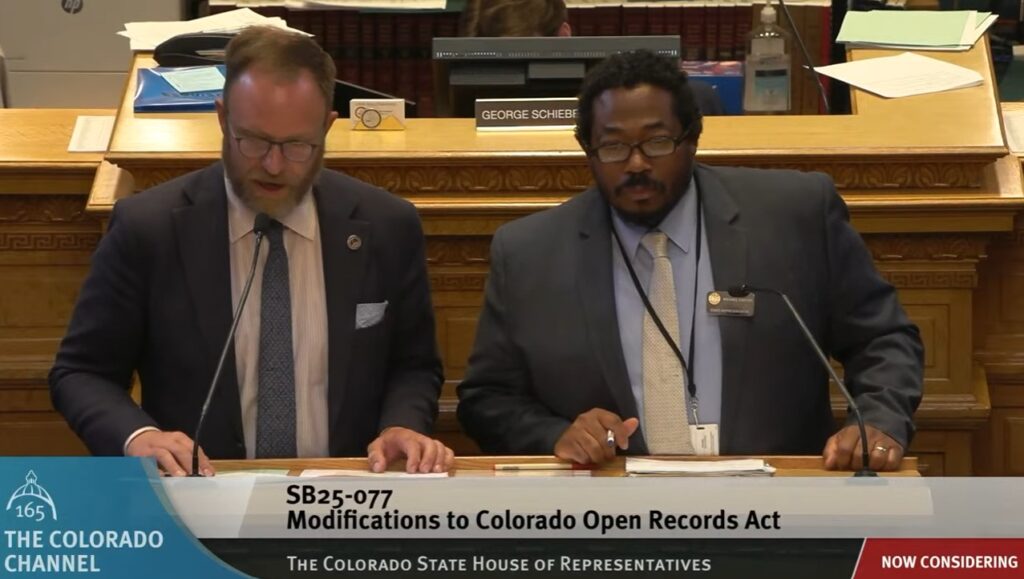By Jeffrey A. Roberts
CFOIC Executive Director
A bill that extends Colorado Open Records Act response times for public and commercial requesters is headed to Gov. Jared Polis.
The legislator who introduced Senate Bill 25-077, Sen. Cathy Kipp, D-Fort Collins, says the measure is necessary because records custodians are “essentially drowning in CORA requests.”
The bill passed the House 45-19 Monday. If signed into law, it will give state and local government entities five working days, rather than three, to provide records and an additional 10 working days, rather than seven, if “extenuating circumstances” exist. If a request is determined to be “for the direct solicitation of business for pecuniary gain,” governments can charge “the reasonable cost” associated with fulfilling the request — rather than the maximum hourly rate in CORA — and take up to 30 working days to do so.

Journalists, as defined by Colorado’s reporter’s shield law, will not be affected by the longer response times or a provision that lets governments treat multiple requests — “pertaining to facially similar content” made by the same person within 14 days — as one request, ensuring the requester gets only one free hour before research-and-retrieval charges kick in.
The Colorado Freedom of Information Coalition argued against the extended deadline provisions in SB 25-077 because research-and-retrieval fees already are a significant barrier to obtaining public records under CORA, with the maximum hourly rate now at $41.37 (after a free initial hour). CFOIC has counted nearly 1,500 cities, towns, counties, state agencies, special districts, school districts and public universities that have raised their rates since July 1, 2024.
“People have little or no power when their request for records is delayed. They don’t file lawsuits over delayed responses because of the time it takes to resolve a lawsuit,” CFOIC executive director Jeff Roberts testified in legislative committee hearings. Whether requesters can challenge CORA response delays in court may be in question given a recent Colorado Court of Appeals opinion that the Colorado judiciary can’t be sued for delaying its response to a request for administrative records — if the records eventually are provided to the requester. Although the ruling concerned the judicial branch’s records rules, not CORA, both have similar language regarding the right to sue in district court.
It’s unclear how Polis views SB 25-077. In a message to lawmakers last week about a bill concerning name, image and likeness contracts between public universities and student athletes, the governor wrote that he is concerned about a provision making those contracts confidential, which “follows an unfortunate trend of legislative proposals that ultimately impede access to official records that are arguably within the public’s interest to view.”
“These exceptions move transparency in the wrong direction and any other proposals that further prevent or delay public access to information will be carefully reviewed,” Polis also stated. “I encourage my colleagues in the General Assembly to consider transparency across all public institutions and to balance legitimate reasons for exceptions with the public interest.”
Some House members spoke against the CORA bill on second reading last Thursday because it differentiates between public and journalist requesters.
“Should we have a situation where we’re saying that this group of news entities, that they are preferred class, the preferred voices for relaying information that’s happening in government?” said Rep. Stephanie Luck, R-Penrose. “Or should we treat everybody the same such that if you submit the same request on the same day, you would receive the same information on the same day?”
“It’s very concerning to me that we are extending the timeline to begin with, but especially that we would extend the timeline only for some and leave others to wait,” she added.
Rep. Matt Soper, a Delta Republican who sponsored SB 25-077 in the House, said the response deadlines should remain the same for journalists “because what we have heard is and seen, actually, is when the media does make CORA requests, they’re very specific. They’re to the point. They cite the exact area of law. They definitely know what can and can’t be requested.”
SB 25-077 contains some provisions that would benefit records requesters.
It requires government entities to post on their websites rules and policies about how to make CORA requests as well as their records retention policies. If a requester asks, a custodian must provide “a reasonable break-down of costs that comprises the fee charged for research and retrieval of public records.”
The bill also clarifies that a government entity must allow electronic payments for public records if that government entity lets the public pay for services or products electronically. Some governments still require requesters to write paper checks for public records, interpreting a 2023 CORA amendment to mean that records custodians don’t have to accept credit cards if that designated person doesn’t take credit cards for other services or products.
Follow the Colorado Freedom of Information Coalition on X or BlueSky. Like CFOIC’s Facebook page. Do you appreciate the information and resources provided by CFOIC? Please consider making a tax-deductible donation.




